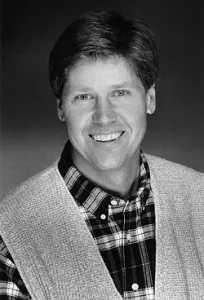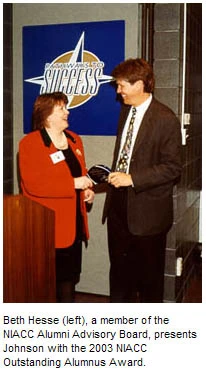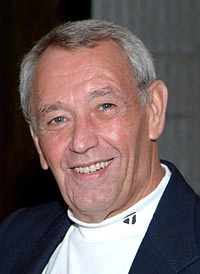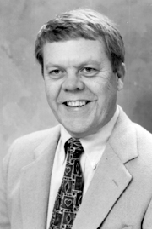2003

Dave Alan Johnson grew up in Buffalo Center, the youngest child of Colonel Roy B. and Bonnie Johnson. After high school graduation, he attended North Iowa Area Community College on a basketball scholarship. Besides sports, music was a big part of his life. He was a member of the NIACC Singers and occasionally toured during the summer with his older siblings, known as “The Johnsons,” who performed across Iowa and the nation in the ‘70s and ‘80s.
After graduating from NIACC in 1976, Dave transferred to Arizona State, earning a degree in music. He taught music for one year, then headed to California, where he got his start in commercials. Now, as a writer, he’s teaching Hollywood a thing or two. He has been a successful member of the Hollywood community for more than a decade, but he has not forgotten his heritage. In fact, his Midwestern roots are often the inspiration for his work.
He has shown his creative talents for such leading entertainment companies as Warner Brothers, DreamWorks, Disney, Paramount, Sony, MGM, FOX, ABC, NBC, and CBS. He has created and produced such celebrated television series as ABC’s “Jack’s Place” starring Hal Linden, the critically acclaimed NBC series “Against the Grain” starring Ben Affleck, and CBS’s “The Client” with JoBeth Williams. In addition, he co-created and produced “High Incident” with Steven Spielberg.
This season, he serves double duty as the creator of PAX TV’s original series “Sue Thomas: F.B.Eye” starring Deanne Bray in its first season and “Doc” starring Billy Ray Cyrus now in its third season. He works on both series, which are filmed in Toronto, with his brother, Gary, and sister-in-law, Joan. In the past month, “Doc” received the prestigious Epiphany Prize at the annual Movieguide Awards, and both shows contributed to the best performance ever for PAX TV’s Sunday night line up with nearly two million viewers.
Dave and his wife, Diane, live in Moorpark, CA, with their daughter Alex, age15, and son Matt, age 13. Despite his hectic work schedule, which includes frequent trips to Toronto, Dave finds time to attend his daughter’s high school swim meets and to coach his son’s basketball team.
He still feels his greatest assets were acquired while growing up in Iowa. “My roots and faith have given me an ability to touch the hearts and minds of everyday folks across the country because I’m one of them,” he said. “It’s something I’m proud of – it’s who I am.”
Dave spoke at the NIACC’s 2003 Pathways to Success leadership luncheon on April 28, 2003.
Dave Johnson Speech
Dave Johnson is a television writer/producer in Hollywood, CA. He grew up in Buffalo Center, IA, and graduated from North Iowa Area Community College in 1976. He gave the following speech at the NIACC Alumni Association’s Pathways to Success leadership luncheon on April 28, 2003, when he was also named NIACC’s 2003 Outstanding Alumnus.

I just wanted to say thank you very much for this award and honor. It’s nice to once again see my family and friends. You may not know this, but this area is what the people I work with refer to as “Fly-Over Country.” In meetings they’ll ask what the people in “fly-over country” will think. These are people who have never been in “fly-over country,” yet they somehow have this sense that they know who the people in “fly-over country” are. They don’t, usually, and if you turn on the TV’s very often, that explains why you get what you get. I consider this home, and there are a few of us who do, and we think we have a better sense of who these people are and what they’re about because we, in turn, think that’s who we are. And we also happen to be very proud of that.
Many people want to ask me and want to know about Hollywood. Perhaps the most common question I get is how did someone from Buffalo Center, Iowa end up doing what you do. And I give the answer, and it’s an honest answer, it sounds glib sometimes, but it’s not meant to be. It’s divine intervention. Divine intervention got me where I am, it’s my purpose to be there. It’s a purpose that I’m proud and moved to have. But along the way, you take amazing turns in your life. And for you students out there, “Pathways to Success” is a great title for this event. I think if you asked everybody in this room my age or older, “Is this where you thought you would be when you were twenty?” Most people in here would tell you, “You know I’m here and I don’t know how I got here. Things happened. Life happens and we end up where we are.” Life is a pathway. One thing I want the students to remember, and I say this to the students more than anyone else here, the pathway is life. Life is not what happens when you get to the end of the road. Life is the path that you’re on, those decisions you make, those things you do as you go through it. I see so many people, and in Hollywood this is one of the biggest problems, I see so many people who are after whatever it is that’s over the next hill. They’re after that thing that they think is out there. They don’t realize that their life is what’s happening to them right now. Obviously in Hollywood it causes a lot of problems. Whenever you live in a place where you can rise to the top very quickly… In a lot of companies, you enter the company, you get promoted and move up the ladder. In Hollywood, it’s like in the old west, you can come in one day, and literally, the next year be a millionaire living the fantasy life. So whenever you have that situation you bring out the best and worst in people. Many people lose sight that that day they’re walking is what their life is about. They forget the things that are important: family, friends, God, integrity.
Hollywood is a place where people will lie to you even when it’s easier to tell the truth, just because they’re used to it. When you come from this area, Northern Iowa, Southern Minnesota, you grow up thinking, most people I know are pretty good people. They do their best, they tell the truth, they try to achieve, they provide for their families, they’re good friends, they’re good neighbors, they’re loyal, and all of the sudden, I ended up in a place where very few people are any of that. I couldn’t believe that they were really like that. It’s because they’ve lost their way on that path, whatever their pathway was. They thought that the pot of gold at the end was what they were supposed to be after, and it didn’t matter how they got there. The only thing that does matter is how you got there. I was taught by my dad a long time ago that it’s a guy who whether the president of the company or the janitor has character, a person who is honest, is trustworthy, has integrity, all the things I mentioned earlier, that’s a person to admire. That’s a person to respect. It doesn’t matter how much money that you have. I know a lot of people who have a lot of money who I don’t respect them at all. I also know a lot of people with very little money who I respect immensely.
When you’re twenty years old, people are going to put pressure on you. People are going to say that you have to do it this way, that you have to cut corners, it’s ok, no one will know. When you’re 25 years old, you’ll think, “Hey, I want to get ahead in this company, I want that job. If I just get enough money over here, then I’m set, then I’m ok.” You can’t do that. A guy told me a great thing one time, he said that souls are never sold in one great auction. They’re bartered away bit by bit, small piece by small piece. You have to know what you believe in. You have to know what your standards are. You have to know what your standards are and don’t compromise them, ever. I see faces looking at me who I know have lived their lives like that. They are tremendous successes and they know who they are as they look at me. I have lived my life like that, and you have given me an award for being a success. You do not have to compromise. In fact what I find interesting, and this has happened to me, especially in Hollywood, where a person who is totally honest and trustworthy all the time is such an anomaly that people who have lied to me or taken advantage of me in some way, have later come back to ask advise, to ask a favor, or to just be friends. Because even someone who lies on a regular basis, when they find someone who will tell them the truth, who will be honest, they find themselves drawn to that person. That’s someone they can trust. They can’t trust all those other people because they’ve been lying to them, and they’ve been lying back.
I left here and went to Arizona State. After that I fell into some things that led me to Hollywood. I made my living as an actor for a while. Shortly thereafter, I started to write because I had a lot of free time. As an actor you have a lot of free time. Pretty soon it took off. In television in particular. Ninety-nine percent of all television producers and creative executives are writers. Things just progressed and suddenly I found myself where I was and I moved from there. But along the way, literally every step of the way, when I got to Hollywood, I looked at things and I said, “Why do people do it like that? It doesn’t make sense.” And the answer I inevitably would get was, “Well, that’s the way we do things.” And I say, “Well why? It’s inefficient, it doesn’t make sense.” So early on I decided that if I ever got in a position where I was in control, I was going to do things differently. That’s what happened. I finally got into control and said, “We’re going to do things differently.” Because it was common sense. Common sense is the greatest gift you can have in terms of education. And it’s the most ignored thing in my world of Hollywood. Students, if it doesn’t make sense, figure out why. Go and do research. Ask. Don’t be dubious about everything. Hear what they have to say. But if you cannot make it make sense on a common sense level, change it. Figure out how change it and come in with it.
Some of you will stay here. Some of you will go out, to New York, or L.A. or where ever and live your life, and what you take from here is such a gift. You don’t know it yet, but you will. It is such a gift. You have been brought up in a common sense culture. You have been brought up around people who are decent and good and have common sense. You have no idea how rare that is when you get out there. So don’t lose that, and don’t let other’s make you feel inferior because you didn’t come from some east coast established school, or some west coast school. I once did a thing when I got out there. I said, “There’ve got to be some network executives out there who think like we do who we can meet and hook up.” We went to the top three executives at every network, and every single one of them was from either the west coast or the east coast. And every one had gone to some elitist university on the east coast or Stanford, Cal, UCLA, or USC on the west coast. That is why people call us “fly-over country.” They make such bad decisions.
“Against the Grain,” which was the show that really launched my partner at the time and I to the top level. Before that we had made a good living. We had done quite well. We were writing for network shows. We had written movies for Paramount or Universal. We were doing very well, but when we got to “Against the Grain,” it put us in a whole new ballpark. Here’s how that experience went. We had been at Paramount, we were coming out of a deal there and we got a call from someone we knew at Warner Brothers who said, “NBC is looking for a football show. They want to do a show that’s sort of ‘Friday Night Lights.’ Would you guys like to come and talk about it.” We said sure. We had never read “Friday Night Lights” in our life. So the first the thing we do is go and read it. It is a dark, terrible indictment. It would never work as a television show. So we said, “We’d love to do a show about small town football, that’s right up our alley. But have you read ‘Friday Night Lights?’” They said, “No. But it’s really selling well.” We told them, “Trust us, you don’t want to do that show. It’d never work on television. But we’d love to do an ‘Andy Griffith’ type show based on a football coach who, with his family lives in a small town in Texas.” Now in Texas, as here, on Friday night what are people going to do? They’re at football games, or basketball games. That year, NBC, this is how I know it’s divine intervention, heard about a thousand pitches. People coming in with ideas. From those ideas, they had about one hundred and twenty scripts written. Of those, only fourteen had a first episode filmed, a pilot episode. Of those fourteen, only one became a series, “Against the Grain.” There were huge names who didn’t make that list. Well that put us in a whole new category. And critically it was received very well.
I have to tell you one story about “Against the Grain.” We had to cast the father, who was the football coach, and the son, who was at that time sophomore in high school and a football star. So we were casting and casting and finally came up with who we thought was the right guy for the role of the son. And at that time he was unknown. His name was Ben Affleck. We took him over to the network along with Warner Brothers. We told them these were the actors we wanted in it. They liked everyone except for one guy…Ben Affleck. The president of NBC at the time said, “You know, I just don’t ever see him on the cover of a magazine.” Well, we fought. And this is another thing I wanted to tell the students. Don’t be afraid to fight for what you believe in. There’s a way to do it without sounding belligerent. There’s a way to do it where you don’t close doors or burn bridges. But fight for what you believe in. Virtually every decision I have made in this business, where I had an inner sense that this was the way to go, this was the person to cast, this was the show to do, every time, someone has told me I couldn’t do it that way. Every time. If I had listened to them, I wouldn’t be close to where I am today. However, that doesn’t mean that you go in and say, “I have all the answers.” Because even when someone tells you something, something you can pick out I’ve always said that I don’t care where the idea comes from, I don’t care who gives me the idea, when the show’s done, it’s got my name on it. I’m an idiot if I don’t take good ideas. I may not like the person who gives me the idea, I’m an idiot if I don’t take it. If it’s offered. But don’t be afraid to stand up. And we stood up. We said, “We know he [Ben Affleck] is the guy. We’re not going to do the series unless it’s with him.” Thank goodness we had the head of Warner Brothers, who’s now the head of CBS and Paramount, said that he thought Ben was the guy too. The show had great critical success. It launched my career. It didn’t do as well in the ratings as it should have. There was a reason for that. NBC’s network schedule came out, it’s a show about a football coach in a small town that worships Friday night football. We got the call from NBC, they said, “You’re on the schedule. Bad news. You’re on Friday nights at eight o’clock, you premiere October first.” And I said, “Guys you can’t be serious. We’re happy to be there, but you can’t be serious. The show is about these people who are all doing what the show is about.” The president of NBC, who is no longer there, says, “There’s not more than a million people who go to football games on Friday night. It’s nothing. It won’t affect our ratings.” I said, “You need to get in your car and drive from here to New York, because you don’t have a clue what’s out there.” So we immediately go back and start making calls to high school athletic associations, starting in Texas because that’s where our show is set. The high school athletic association Texas says, “One million people in Texas are at a football game every Friday night, and that doesn’t include the participants: players, band members, etc.” California: 300,000-400,000. Florida: 400,000. We stopped counting at 15 to 20 million and we hadn’t even called half the states yet. So we went back to NBC and tell them. They say, “Oh, we don’t believe them.” We asked them, “What isn’t to believe. Just fly over the country on a Friday night. There’re pockets of lights out there. It’s those football games. And people are at them.” They left the show on, it was a critical success, but we never got the ratings we needed to keep the show on. Although we found out later there was a whole political battle going on between two powers over at NBC. There was a new guy who liked our show and an older guy didn’t like our show. We sort of got thrown out like the baby with the bathwater. That’s the other thing for you students. Things are going to happen to you that you can’t control. That’s life. You do what you can do, you control what you can control, that’s all you can do. You do your best. You do it the best way you can. And then you move on. Oh, by the way. When Ben Affleck won an Academy Award for “Good Will Hunting” and was on the cover of Esquire with his shirt open, I bought a copy of it and sent it to that executive.
I’ll tell you another example, because I know people like Hollywood stories, and I have met some good people out there and in New York. But I’m here to tell you, although this is not to be negative, but rather to be realistic…that brings up another thing I wanted to tell the students. Be questioning, but don’t be negative. Don’t be cynical. Negativity and cynicism are the great killers of yours and our lives. See the glass half full, not half empty. We live in the greatest country on earth. I look around and I’m moved because I realize how blessed I am. And I suspect most of us in this room really are. So live life from that perspective. So I don’t tell these stories to be negative, but to be realistic. Understand that not everybody shares your perspective. Everybody doesn’t share your life, your view. The gatekeepers in our society, and I don’t speak for all industries, but I know my industry quite well: the American media, which happens to be the most powerful force on the planet earth. It can and does shape what people think. It shapes what the world thinks of us. Be discerning in what you buy. Be discerning in what you watch. Don’t be quiet about it. Don’t sit back and say, “That’s the way life is.” I’ll give you one quick story to tell how I’ve touched people I work with. Steven Spielberg, I worked with him every day for a year. I’ve been to OZ, I know it’s a little man behind the curtain. And I could tell lots of stories in lots of ways. But I’ll just give you one. I stood there with my jaw open. We had been working on a script for “High Incident,” the story is a lawyer comes through, he’s had a bad time, he drives his car, he goes a little wacky. And Steven came up with this idea, he said, “I want him to shoot through a wall at the end of his driveway into his pool and not be able to get out of his car.” “Sure, Steven, if we can find the room in the budget.” They find this house and it’s a really nice house, and he says, “I don’t know. This guy doesn’t have money. He’s down on his luck. He’s an attorney, but he hasn’t had work in eternity. He lives in a nothing house. He lives in like a $700,000 house. He doesn’t have money.” I swear to this day that’s true. People out there do not share your values. Know your values, know who your master is, and do what’s right. Take what you got from this place, which is a great place, and you’ll do fine.

Married with children, Allen Blume enrolled at North Iowa Area Community College seven years out of high school. He earned his Associate Degree from NIACC in 1970, continued his education at Buena Vista University in Storm Lake, and earned his Doctor of Optometry Degree from Southern College of Optometry in Memphis, TN. He has practiced optometry in Iowa for nearly 30 years. He started in private practice with Dr. Keith Pierce in Storm Lake in 1975. Allen then practiced in Mason City from 1979 to 1992. Along with stints as a faculty member at the University of Alabama School of Optometry in Birmingham, AL, and clinic director at the Jackson Eye Institute in Jackson, MS, he has served as a medical malpractice and practice evaluation consultant since 1982. For the past 11 years, he has been practicing in Fort Dodge with Dr. Wes Seaver and his daughter Dr. Regina Blume Cygan. Allen’s wife, Andi, is the office manager at Central Iowa EyeCare P.C. Regina and her brother, Michael, who is a counselor at Prairie Ridge Treatment Center in Mason City, are also graduates of NIACC. The rest of his family includes stepchildren Daniel, Debra and Dodi. Dr. Blume’s professional memberships are extensive including serving as president of the Iowa Optometric Association in 92-93. He has contributed several chapters in medical textbooks and authored a number of articles in professional journals as well as provided numerous lectures and clinical workshops in continuing medical education courses in the U.S. and Canada. He is a member of Sacred Heart Catholic Church in Fort Dodge and his community involvements have included Knights of Columbus, Elks Club and Rotary Club. While attending NIACC, he played on the golf team, was a member of the Young Republicans, earned the Angus MacNider Memorial Scholarship, and worked 35 hours per week as a licensed barber at the Federal Barbershop. For recreation and relaxation he enjoys golf, computers and pocket billiards. The Blumes continue to be strong advocates for NIACC and the Community Colleges of Iowa.
“I contend that, for the tax dollars spent, Community Colleges are one of our very best investments and provide one of the biggest ‘bangs for the buck’ that our tax dollars produce. I am extremely fond of Mason City in general and NIACC in particular, and I am indebted to the community and the College in many ways for what I have accomplished and enjoyed in my life. The heart-felt appreciation and thanks that I hold toward NIACC is one of my deepest and most sincere emotions.”

Kary Paulson graduated from North Iowa Area Community College in 1967. He completed his bachelor’s degree at Mankato State University two years later. Following college, he worked as a State Bank Examiner for four years before joining NSB Bank, which the Paulson family has owned since 1954. He served many years as President and CEO of the bank, which has locations in Northwood and Mason City. He currently serves as Chairman of the Board. He is a member of the Northwood Development Corporation and First Lutheran Church and a lifetime member of the NIACC Alumni Association. A former NIACC Alumni Advisory Board member, he was also featured in the NIACC FIRST advertising campaign. From 1996 to 2002, he served on the NIACC Foundation Board of Directors as well as its Executive Committee and Investment Committee. He is immediate past president of the Foundation Board. As a member of the “Keeping NIACC First” Campaign Executive Committee, he endowed the NSB Bank Scholarship Fund through the NIACC Foundation in 1998. This scholarship is awarded annually to a graduate of Northwood-Kensett, Mason City or Newman High School who is enrolled in a business or advanced technology program at the College. Kary spends the majority of his time on his ranch in Jackson Hole, Wyoming, where he enjoys fishing and horseback riding. He and his wife, Carol, have three grown children: Kirk, Sarah and Kris. Both of his sons work for NSB Bank.
“I believe NIACC provides an affordable, well-rounded choice for study. NIACC gives North Iowans the opportunity to expand their horizons and is a very valuable resource for North Iowa employers. I believe the more educated a workforce can be, the more productive their work will be.”
Pathways to Success Student Leaders
| Elizabeth M. Arndorfer Mason City, IA |
Kelly A. Hall Garner, IA |
Amanda M. Ouverson Forest City, IA |
| Amy M. Ask St. Ansgar, IA |
Joshua D. Halverson Garner, IA |
Jerry W. Parks Charles City, IA |
| Scott D. Brandt Mason City, IA |
Chelsey L. Hanig Sheffield, IA |
Tyler D. Rasmussen Colo, IA |
| Eric M. Coborn Mason City, IA |
Marie E. Harms Mason City, IA |
Linda S. Rodberg Forest City, IA |
| Chase J. Cookman Mason City, IA |
Julieann D. Jacobson Mason City, IA |
Pedro A. Salazar Arequipa, Peru |
| Clinton T. Cummings Denver, IA |
Stacy L. Johnson Mason City, IA |
Beth A. Schmidt Garner, IA |
| Amanda I. DeBettignies Sheffield, IA |
Zakaria Joundi Marrakech, Morocco |
Trisca D. Sheimo Fertile, IA |
| Riley E. Dirksen Mason City, IA |
Adam W. Kampman Hampton, IA |
Carissa J. Silver Dumont, IA |
| Rebecca L. Fedders Mason City, IA |
Charlotte J. Lindstrom Mason City, IA |
Lori L. Smith Mason City, IA |
| Jamie K. Ford Cedar Falls, IA |
Billie J. Moorehead Mason City, IA |
Jennifer R. Sprung Nora Springs, IA |
| Erica Gosh Grafton, IA |
S. David Muller Clear Lake, IA |
Travis M. Swehla Alta Vista, IA |
| Cassandra J. Nelson Mason City, IA |
